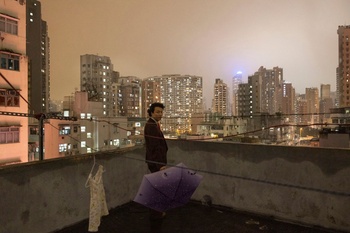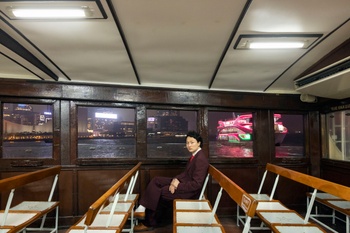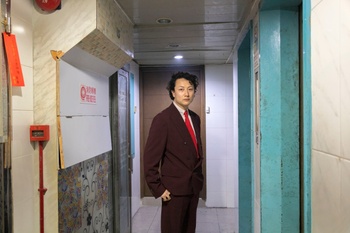Those heading to the Listen Festival should prick up their ears for Bolis Pupul. Following his successes with Charlotte Adigéry, the Ghent-based musician debuts solo with Letter to Yu, a tribute to his late mother. “I wish I had travelled to Hong Kong with her.”
© Bieke Depoorter Magnum Photos
What's not to be missed at the Listen Festival?
A fairytale in church
Marina Herlop has seen the light. Following her appearance last year at the Église Notre-Dame de Laeken, she is now back there. The Catalan artist (her full name is Marina Hernández López) is a classically trained pianist and singer, but started experimenting with electronics a few years back. In her otherworldly universe, she makes analogue and electronic sounds go hand-in-hand with phonetic vocal lines, giving her music a fairytale feel. Think a mix of Björk, CocoRosie, and Le Mystère des Voix Bulgares.
Marina Herlop 26/3, Église Notre-Dame de Laeken
Yeah guitars go!
Guitars at the Listen Festival? Why not! Especially if Fenne Kuppens is responsible for it. The singer of Belgian post-punk band Whispering Sons is curating an evening in the catacombs of Volta with Plexi Stad and Tramhaus. The first one is a no-wave band from Antwerp that pretends 1982 never went away. The second is a mad bunch from Rotterdam that named itself after a local pita shop. Unctuous, greasy and a touch rancid.
Volta curated by Fenne Kuppens: plexi stad + tramhaus 28/3, Volta
Eclectic party
For a few years now, Alyah Rivière has been making a name for herself as DJ AliA. Meanwhile, this native of Leuven now based in Brussels has toured all over the world and is acclaimed for her eclectic style. With her AliA Invites nights, she gave a forum to young talent, and recently she has been doing the same with her own label, Artisjok. At the Listen Festival, she pairs her wagon with Maloca, the label of DJ, producer, and globetrotter Le Motel, dedicated to mixing electronic and organic sounds. Following in her wake are M I M I, Mankiyan, INVT, Donia, and many others.
AliA x Maloca Records 29/3, C12
Spiritual blend
This month, Brussels-based DJ and producer Lefto Early Bird will release his new album Motherless Father on Brownswood, the label of British DJ and radio host Gilles Peterson. For the Listen Festival, Lefto Early Bird created an audiovisual performance that merges his love of club music and spiritual jazz with dance, a performance that comes alive thanks to the input of Isabelle Clarençon, Joffrey Anane, Rashad Zangaba, and Kassy Bondoko.
Lefto Early Bird presents 'Motherless Father in movement' 30/3, Bozar
Tunnel vision
Every year, the Listen Festival seeks out unique venues. Not only is that enjoyable but it also has great symbolic value in anchoring club music in the urban fabric. The place that captures the imagination the most is the tunnel complex under Louizaplein/Place Louise. CJ Bolland, Nosedrip, Paul Seul, Crystallmess, and the Burenhinder collective will, among others, make the small ring buzz with beats instead of cars. The Lord could not have picked a better day to resurrect.
The Tunnels 31/3, tunnel complex Louiza/Louise
“I once had a green belt,” smiles Bolis Pupul, or Boris Zeebroek in daily life. “My sister Sarah and I were really into judo. We were both going to be Olympic champions. I was the best in Flanders as a youngster, I never lost a single match.” Zeebroek eventually swapped the tatami for the concert stage, judo bars for chord progressions and fingerings. “As a child, my sister and I were allowed to choose an instrument each, and so our interest gradually shifted. My sister chose the violin, I went for the piano. I have no idea why. I had to play Bach and Mozart, things I had never listened to.”
All this changed when Zeebroek's father Luc, known in Flanders as the cartoonist, TV and theatre maker Kamagurka, bought a guitar and an amplifier in the music shop of his fellow comedian Peter Van Heirseele alias Herr Seele. “There was a songbook by Beck too in that shop, from his album Odelay,” says Zeebroek. “That's how I started playing guitar.” Zeebroek senior never forced anything on his children, says son Boris. “He was great at scattering things around, carelessly, as if they had fallen out of his pockets while walking around. Of course we had some encouragement at home. My father had his studio in our house and there was stuff for drawing and painting lying around everywhere. I remember a New Year's Eve when the three of us were painting. When the clock struck 12, we ran outside to watch the fireworks and then we just carried on painting.”
As children, my sister and I preferred to ignore our Chinese roots; the fact that we looked different was often a reason for others to bully us
They even kept on drawing and painting when on holiday, for fun. “My father's publisher lived in Greece. We sat on the beach drawing in our sketchbook. Later in the day, my dad went to show his work, and we went to show ours.” That sketchbook has never left, Zeebroek says. He still has one in his bag. “I really enjoy drawing or writing things down. Something that existed only in your mind until then thus becomes part of reality. That also has something frightening about it sometimes.”
Zeebroek did the same when he travelled to Hong Kong for the first time in his life in 2018. Overcome by jet lag, he stepped out of a minivan into the urban chaos of Ma Tau Wai Road, the street where his mother, Yu Wei Wun, was born in 1959. “My mother lived in Hong Kong until she was seven, then she and her sisters came here and united with their parents, who were already living in Belgium. She passed away here in 2008 after a cycling accident.”

© Bieke Depoorter Magnum Photos
As cars whizzed past around him outside the maternity centre where his mother was born and which is now converted into a residential care centre, Zeebroek wrote a letter to his mother. That letter, Letter to Yu, also became the title track of his first solo album. “That wasn't planned at all, but when I played a recorded version of that letter to Stephen and David (Dewaele, of Soulwax and the label DEEWEE, ed.) they immediately said I should do something with it. They are very good at that, seeing things you don't see yourself or don't think are interesting, from a kind of bird's eye view. That's how that letter became the frame for my record.”
Zeebroek translated the letter into English and put a vocoder on it. “It felt too naked, I guess I wanted to make it less pathetic. It also captures the blur of that moment; it felt like I had walked into a film set. It was really hectic there, and at the same time the sound seemed muffled by the tall buildings.”
He wandered the streets, trying to imagine where his mother and grandparents had walked around. “I wondered what it would have been like if she had stayed there,” Zeebroek says. “It made me very sad.” “Why did it take me so long?” he writes in the letter. “I regret that we never travelled there together. As children, my sister and I preferred to ignore our Chinese roots; the fact that we looked different was often a reason for others to bully us. My mother did send my sister and me to Chinese classes in Brussels when we were about seven or eight years old. But that didn't really work as we weren't really interested. And because those lessons were taught in French.” (Laughs)

© Bieke Depoorter/Magnum Photos
On the pre-release track “Completely Half”, Zeebroek expresses his feeling of how he, as a child with mixed roots, never felt completely 'whole' anywhere. “At school there was a guy from Vietnam called Thang who was a few years older than me. My teacher also called me Thang, just because I had Asian roots like him. That may seem like a minor thing, but it is no fun when you are always being reminded that you are different.”
Being Kamagurka's children also made them extra special in Ghent. “I didn't suffer from that, but I did become sensitive to certain things. Opportunism, for example. When you are in the spotlight, there are more and more people who want to hitch their wagon to you and take advantage of you. I have seen that with my father, which is why I spot it quickly.”
Boris Zeebroek, who used to form The Hong Kong Dong with his sister and also keeps himself busy as a multi-instrumentalist with The Germans, saw himself catapulted into the spotlight in recent years. Alongside Charlotte Adigéry, with whom he first collaborated on the Soulwax-curated soundtrack to Felix Van Groeningen's film Belgica, he broke through internationally. Their joint album Topical Dancer received praise at home and abroad, including from British newspaper The Guardian and US online music magazine Pitchfork.

© Bieke Depoorter/Magnum Photos
Over the past two years, the duo toured the world, as far away as the US, where they played supporting act to Grace Jones at the legendary Hollywood Bowl. “But it's not like we're super famous,” Zeebroek laughs. “I think where we are now is the best place. We can still walk around the streets in peace. After the show, we went to see Roxy Music in LA. We were recognised a few times then, but people mostly left us alone. Once a man came up to me on a zebra crossing in Mexico City, but he was nice about it. Every time that we went to festivals like Rock Werchter with my dad, everyone used to shout 'Hey, Kama!'”
The Beatles once played the Hollywood Bowl. “So did Monty Python,” Zeebroek laughs. “It was a surreal moment, but you shouldn't make it bigger than it is. The people in the front rows were feasting on lobster and caviar and they were not really interested in us, the support act. Then at the back of the arena you have this gigantic mountain that you look up to. That doesn't really give back much. (Grins) I remember how Charlotte and I looked at each other a lot.”
Together with Charlotte Adigéry, Zeebroek managed to turn electronic pop into a funky place where Devo, Grace Jones, Talking Heads, and Soulwax came together. They also managed to cover delicate socio-political topics using hip-aiming pop songs full of sharp humour . On his solo record, Zeebroek lets beats and bleeps bounce around and tries to get you to dance even more explicitly in instrumental tracks like “Kowloon”. “When people listen to music, they are first drawn to a voice, but I find it liberating to work without lyrics too.”
Zeebroek does sing a few times on Letter to Yu, but he also samples traditional chants, a mother and child in the Hong Kong streets, and the doctor he had to visit in Shenzhen. Language plays an important role on Letter to Yu. “I can't speak Cantonese, but my Mandarin isn't any better,” it sounds in “Cantonese”. “A common thread in my connection with Hong Kong and China is that communication is complex. There are many misunderstandings. Speaking Mandarin in Hong Kong, is like talking French in Flanders. After my mother passed away, Sarah and I started studying Mandarin again so that we could speak to our grandparents. My grandfather, who landed in Antwerp as a ship cook and started a restaurant there, came from Shanghai and ended up in Hong Kong as a small boy. So they spoke both Mandarin and Cantonese. Sarah and I were proud that we could finally speak some Mandarin, but then they pretended not to understand. My grandfather had a love-hate relationship with China.” In turn, Zeebroek's stage name is a tribute to them. “They always called us 'Salah and Bolis.'” (Laughs) Pupul is a pet name his father coined for him.
The two most personal songs on Letter to Yu, “Completely Half” and “Ma Tau Wai Road”, have English as their main language. The latter is sung by Zeebroek's sister, credited as Salah Pupul. “These sounds of China, they belong to you,” she sings. “If there had to be one feature on the record, it was my sister,” Zeebroek says. “In the clip, you see her walking through Hong Kong for the first time. That was a very important moment for her. Even though it has now been a while since my mother passed away, I am still processing that. Part of me also doesn't want that feeling to go away, I want to be able to stay sad. I want to keep missing her.”
Yu Wei Wun can also be heard on Letter to Yu. “That was the puzzle piece I still needed,” Zeebroek says of the closing track “Cosmic Rendez-Vous”. “My sister and I went in search of recordings of my mother at Stephen and David's suggestion. Sarah found a tape with my mother talking to an astrologer. My mother was a therapist, but she had big questions of her own. She wanted to understand things better, but at the same time she was very critical. 'How do you know that?' you hear her say in that conversation. I find that very beautiful. My mother taught us to go deeper. It is healthy to question yourself now and then.”
Bolis Pupul, 31/3, Bozar, listenfestival.be
Read more about: Muziek